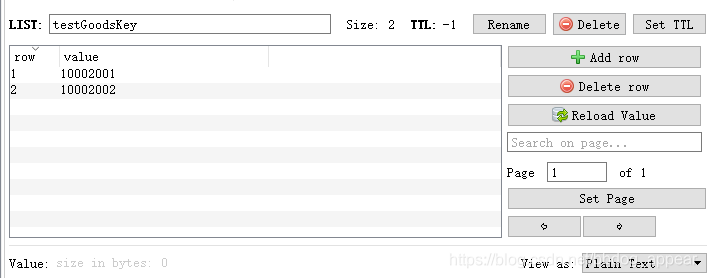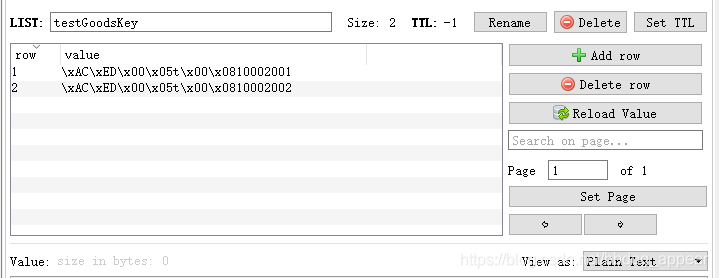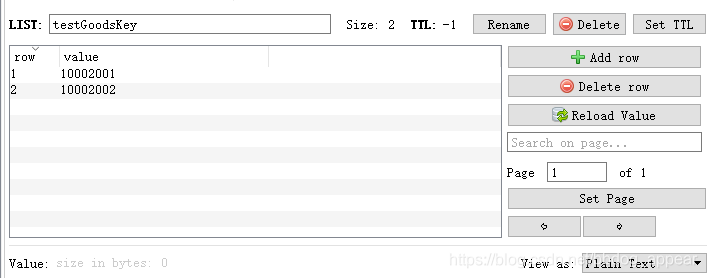How to configure sequence and deserialization of RedisTemplate in Redis
RedisTemplate configuration sequence and deserialization
Spring Data Redis provides excellent encapsulation to facilitate the use of Redis operations. A highly encapsulated RedisTemplate class is provided to perform a series of redis operations, and the connection pool is automatically managed; at the same time, the transaction encapsulation operation is handed over to the container for processing.
A variety of strategies (RedisSerializer) are provided for the "serialization and deserialization" of data
The default is to use JdkSerializationRedisSerializer, as well as StringRedisSerializer, JacksonJsonRedisSerializer, OxmSerializer, and GenericFastJsonRedisSerializer.
Introduction
JdkSerializationRedisSerializer: POJO object access scenario, using JDK's own serialization mechanism, serializes the pojo class through ObjectInputStream/ObjectOutputStream, and finally stores the words in redis-server section sequence. This is the current default serialization strategy.
StringRedisSerializer: When the Key or value is a string, the byte sequence of the data is encoded into a string according to the specified charset, which is "new String(bytes, charset)" and "string.getBytes(charset)" direct encapsulation. is the most lightweight and efficient strategy.
JacksonJsonRedisSerializer: The jackson-json tool provides conversion capabilities between javabean and json. It can serialize pojo instances into json format and store them in redis, or convert json format data into pojo instances. Because the Jackson tool needs to explicitly specify the Class type when serializing and deserializing, this strategy is slightly more complicated to encapsulate. [Requires jackson-mapper-asl tool support]
GenericFastJsonRedisSerializer: Another conversion between javabean and json, and the Class type also needs to be specified.
OxmSerializer: Provides the ability to convert javabeans to xml. Currently available three-party support includes jaxb, apache-xmlbeans; the data stored in redis will be xml tools. However, using this strategy will make programming more difficult and the most efficient; it is not recommended. [Requires spring-oxm module support]
Practice
1) Dependency (version inherits the SpringBoot version)
<dependency> <groupId>org.springframework.boot</groupId> <artifactId>spring-boot-starter-data-redis</artifactId> </dependency>
2) RedisConfig class
Add beans, specify key/value and the serialization and deserialization of HashKey and HashValue into FastJson.
package com.sleb.springcloud.common.config;
import com.alibaba.fastjson.support.spring.GenericFastJsonRedisSerializer;
import org.springframework.context.annotation.Bean;
import org.springframework.context.annotation.Configuration;
import org.springframework.data.redis.connection.RedisConnectionFactory;
import org.springframework.data.redis.core.RedisTemplate;
import org.springframework.data.redis.serializer.GenericToStringSerializer;
/**
* redis配置
* @author 追到乌云的尽头找太阳(Jacob)
**/
@Configuration
public class RedisConfig {
@Bean
public RedisTemplate<Object, Object> redisTemplate(RedisConnectionFactory redisConnectionFactory) {
RedisTemplate<Object, Object> redisTemplate = new RedisTemplate<>();
redisTemplate.setConnectionFactory(redisConnectionFactory);
// 使用 GenericFastJsonRedisSerializer 替换默认序列化
GenericFastJsonRedisSerializer genericFastJsonRedisSerializer = new GenericFastJsonRedisSerializer();
// 设置key和value的序列化规则
redisTemplate.setKeySerializer(new GenericToStringSerializer<>(Object.class));
redisTemplate.setValueSerializer(genericFastJsonRedisSerializer);
// 设置hashKey和hashValue的序列化规则
redisTemplate.setHashKeySerializer(new GenericToStringSerializer<>(Object.class));
redisTemplate.setHashValueSerializer(genericFastJsonRedisSerializer);
// 设置支持事物
redisTemplate.setEnableTransactionSupport(true);
redisTemplate.afterPropertiesSet();
return redisTemplate;
}
}RedisTemplate serialization problem
Serialization and deserialization rules are inconsistent, resulting in error reporting
1. Configure redisTemplate
<!-- redis数据源 -->
<bean id="poolConfig" class="redis.clients.jedis.JedisPoolConfig">
<!-- 最大空闲数 -->
<property name="maxIdle" value="${redis.maxIdle}"/>
<!-- 最大空连接数 -->
<property name="maxTotal" value="${redis.maxTotal}"/>
<!-- 最大等待时间 -->
<property name="maxWaitMillis" value="${redis.maxWaitMillis}"/>
<!-- 返回连接时,检测连接是否成功 -->
<property name="testOnBorrow" value="${redis.testOnBorrow}"/>
</bean>
<!-- Spring-data-redis连接池管理工厂 -->
<bean id="jedisConnectionFactory" class="org.springframework.data.redis.connection.jedis.JedisConnectionFactory">
<!-- IP地址 -->
<property name="hostName" value="${redis.host}"/>
<!-- 端口号 -->
<property name="port" value="${redis.port}"/>
<!-- 密码 -->
<!-- <property name="password" value="${redis.password}"/>-->
<!-- 超时时间 默认2000 -->
<property name="timeout" value="${redis.timeout}"/>
<!-- 连接池配置引用 -->
<property name="poolConfig" ref="poolConfig"/>
<!-- 是否使用连接池 -->
<property name="usePool" value="true"/>
<!-- 指定使用的数据库 -->
<property name="database" value="0"/>
</bean>
<!-- redis template definition -->
<bean id="redisTemplate" class="org.springframework.data.redis.core.RedisTemplate">
<property name="connectionFactory" ref="jedisConnectionFactory"/>
<property name="keySerializer">
<bean class="org.springframework.data.redis.serializer.StringRedisSerializer"/>
</property>
<property name="valueSerializer">
<bean class="org.springframework.data.redis.serializer.JdkSerializationRedisSerializer"/>
</property>
<property name="hashKeySerializer">
<bean class="org.springframework.data.redis.serializer.StringRedisSerializer"/>
</property>
<property name="hashValueSerializer">
<bean class="org.springframework.data.redis.serializer.JdkSerializationRedisSerializer"/>
</property>
</bean>2. Store value
This time the value is stored, the callback function of redisTemplate is used to store redisValue according to the string serialization method
public void testRedisListPush() {
String redisKey = "testGoodsKey";
List<String> redisValues = Arrays.asList("10002001", "10002002");
// 使用管道向redis list结构中批量插入元素
redisTemplate.executePipelined((RedisConnection redisConnection) -> {
// 打开管道
redisConnection.openPipeline();
// 给本次管道内添加,一次性执行的多条命令
for (String redisValue : redisValues) {
redisConnection.rPush(redisKey.getBytes(), redisValue.getBytes());
}
return null;
});
}redis client: value is a string

3. Value
This time, the returned result defaults to the JdkSerializationRedisSerializer serialization method configured in 1. Configure redisTemplate. Since the serialization methods of storage and retrieval are not uniform, there will be An error condition occurs.
public void testRedisListPop() {
String redisKey = "testGoodsKey";
// 使用管道从redis list结构中批量获取元素
List<Object> objects = redisTemplate.executePipelined((RedisConnection redisConnection) -> {
// 打开管道
redisConnection.openPipeline();
for (int i = 0; i < 2; i++) {
redisConnection.rPop(redisKey.getBytes());
}
return null;
});
System.out.println(objects);
}Error report details: Deserialization failed
org.springframework.data.redis.serializer.SerializationException: Cannot deserialize; nested exception is org.springframework.core. serializer.support.SerializationFailedException: Failed to deserialize payload. Is the byte array a result of corresponding serialization for DefaultDeserializer?; nested exception is java.io.StreamCorruptedException: invalid stream header: 31303030
...
Caused by: org.springframework.core.serializer.support.SerializationFailedException: Failed to deserialize payload. Is the byte array a result of corresponding serialization for DefaultDeserializer?; nested exception is java.io.StreamCorruptedException: invalid stream header: 31303030
at org. springframework.core.serializer.support.DeserializingConverter.convert(DeserializingConverter.java:78)
at org.springframework.core.serializer.support.DeserializingConverter.convert(DeserializingConverter.java:36)
at org.springframework. data.redis.serializer.JdkSerializationRedisSerializer.deserialize(JdkSerializationRedisSerializer.java:80)
... 39 more
Caused by: java.io.StreamCorruptedException: invalid stream header: 31303030
at java.io.ObjectInputStream .readStreamHeader(ObjectInputStream.java:899)
at java.io.ObjectInputStream.(ObjectInputStream.java:357)
at org.springframework.core.ConfigurableObjectInputStream.(ConfigurableObjectInputStream.java :63)
at org.springframework.core.ConfigurableObjectInputStream.(ConfigurableObjectInputStream.java:49)
at org.springframework.core.serializer.DefaultDeserializer.deserialize(DefaultDeserializer.java:68)
at org.springframework.core.serializer.support.DeserializingConverter.convert(DeserializingConverter.java:73)
... 41 more
Solution
1. Get value
需要在redisTemplate.executePipelined入参中再加一个参数:redisTemplate.getStringSerializer(),取值成功,解决问题!!
public void testRedisListPop() {
String redisKey = "testGoodsKey";
// 使用管道从redis list结构中批量获取元素
List<Object> objects = redisTemplate.executePipelined((RedisConnection redisConnection) -> {
// 打开管道
redisConnection.openPipeline();
for (int i = 0; i < 2; i++) {
redisConnection.rPop(redisKey.getBytes());
}
return null;
}, redisTemplate.getStringSerializer());
System.out.println(objects);
}总结
1、使用原生redisTemplate操作数据和redisTemplate回调函数操作数据注意点:
a.原生redisTemplate操作数据
代码
public void testRedisListPush() {
String redisKey = "testGoodsKey";
List<String> redisValues = Arrays.asList("10002001", "10002002");
redisValues.forEach(redisValue -> redisTemplate.opsForList().rightPush(redisKey, redisValue));
}redis客户端数据展示

b.redisTemplate回调函数操作数据
代码
public void testRedisListPush() {
String redisKey = "testGoodsKey";
List<String> redisValues = Arrays.asList("10002001", "10002002");
// 使用管道向redis list结构中批量插入元素
redisTemplate.executePipelined((RedisConnection redisConnection) -> {
// 打开管道
redisConnection.openPipeline();
// 给本次管道内添加,一次性执行的多条命令
for (String redisValue : redisValues) {
redisConnection.rPush(redisKey.getBytes(), redisValue.getBytes());
}
return null;
});
}redis客户端数据展示

c.不同点:
原生redisTemplate操作数据序列化方式是和redis配置统一的,redisTemplate回调函数操作数据序列化方式是自定义的。存值取值是需要注意。
The above is the detailed content of How to configure sequence and deserialization of RedisTemplate in Redis. For more information, please follow other related articles on the PHP Chinese website!

Hot AI Tools

Undresser.AI Undress
AI-powered app for creating realistic nude photos

AI Clothes Remover
Online AI tool for removing clothes from photos.

Undress AI Tool
Undress images for free

Clothoff.io
AI clothes remover

Video Face Swap
Swap faces in any video effortlessly with our completely free AI face swap tool!

Hot Article

Hot Tools

Notepad++7.3.1
Easy-to-use and free code editor

SublimeText3 Chinese version
Chinese version, very easy to use

Zend Studio 13.0.1
Powerful PHP integrated development environment

Dreamweaver CS6
Visual web development tools

SublimeText3 Mac version
God-level code editing software (SublimeText3)

Hot Topics
 1386
1386
 52
52
 How to build the redis cluster mode
Apr 10, 2025 pm 10:15 PM
How to build the redis cluster mode
Apr 10, 2025 pm 10:15 PM
Redis cluster mode deploys Redis instances to multiple servers through sharding, improving scalability and availability. The construction steps are as follows: Create odd Redis instances with different ports; Create 3 sentinel instances, monitor Redis instances and failover; configure sentinel configuration files, add monitoring Redis instance information and failover settings; configure Redis instance configuration files, enable cluster mode and specify the cluster information file path; create nodes.conf file, containing information of each Redis instance; start the cluster, execute the create command to create a cluster and specify the number of replicas; log in to the cluster to execute the CLUSTER INFO command to verify the cluster status; make
 How to clear redis data
Apr 10, 2025 pm 10:06 PM
How to clear redis data
Apr 10, 2025 pm 10:06 PM
How to clear Redis data: Use the FLUSHALL command to clear all key values. Use the FLUSHDB command to clear the key value of the currently selected database. Use SELECT to switch databases, and then use FLUSHDB to clear multiple databases. Use the DEL command to delete a specific key. Use the redis-cli tool to clear the data.
 How to use the redis command
Apr 10, 2025 pm 08:45 PM
How to use the redis command
Apr 10, 2025 pm 08:45 PM
Using the Redis directive requires the following steps: Open the Redis client. Enter the command (verb key value). Provides the required parameters (varies from instruction to instruction). Press Enter to execute the command. Redis returns a response indicating the result of the operation (usually OK or -ERR).
 How to read redis queue
Apr 10, 2025 pm 10:12 PM
How to read redis queue
Apr 10, 2025 pm 10:12 PM
To read a queue from Redis, you need to get the queue name, read the elements using the LPOP command, and process the empty queue. The specific steps are as follows: Get the queue name: name it with the prefix of "queue:" such as "queue:my-queue". Use the LPOP command: Eject the element from the head of the queue and return its value, such as LPOP queue:my-queue. Processing empty queues: If the queue is empty, LPOP returns nil, and you can check whether the queue exists before reading the element.
 How to use redis lock
Apr 10, 2025 pm 08:39 PM
How to use redis lock
Apr 10, 2025 pm 08:39 PM
Using Redis to lock operations requires obtaining the lock through the SETNX command, and then using the EXPIRE command to set the expiration time. The specific steps are: (1) Use the SETNX command to try to set a key-value pair; (2) Use the EXPIRE command to set the expiration time for the lock; (3) Use the DEL command to delete the lock when the lock is no longer needed.
 How to read the source code of redis
Apr 10, 2025 pm 08:27 PM
How to read the source code of redis
Apr 10, 2025 pm 08:27 PM
The best way to understand Redis source code is to go step by step: get familiar with the basics of Redis. Select a specific module or function as the starting point. Start with the entry point of the module or function and view the code line by line. View the code through the function call chain. Be familiar with the underlying data structures used by Redis. Identify the algorithm used by Redis.
 How to solve data loss with redis
Apr 10, 2025 pm 08:24 PM
How to solve data loss with redis
Apr 10, 2025 pm 08:24 PM
Redis data loss causes include memory failures, power outages, human errors, and hardware failures. The solutions are: 1. Store data to disk with RDB or AOF persistence; 2. Copy to multiple servers for high availability; 3. HA with Redis Sentinel or Redis Cluster; 4. Create snapshots to back up data; 5. Implement best practices such as persistence, replication, snapshots, monitoring, and security measures.
 How to use the redis command line
Apr 10, 2025 pm 10:18 PM
How to use the redis command line
Apr 10, 2025 pm 10:18 PM
Use the Redis command line tool (redis-cli) to manage and operate Redis through the following steps: Connect to the server, specify the address and port. Send commands to the server using the command name and parameters. Use the HELP command to view help information for a specific command. Use the QUIT command to exit the command line tool.




